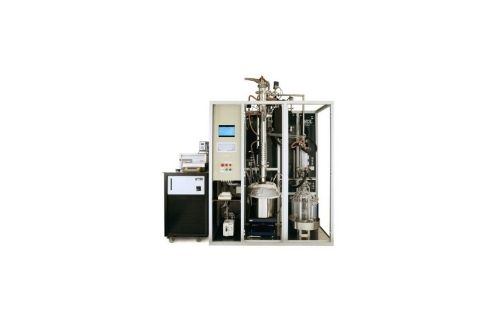Description
ASTM D2892 Distillation from 2L up to 100L.
D2892 TBP Distillation for Crude Oil, Petroleum Products, Chemicals, Bio fuels, Bio Oils, Ethanol Etc.
FULLY AUTOMATIC ASTM D2892 UNITS TYPE E AND F
- No operator intervention for each step of the distillation up to FBP 400 C AET
- Up to 150 TBP analysis per year
- Easy operation in local mode and more versatile use in remote supervisor model with the dedicated software
Fully automatic distillation unit in accordance with ASTM 2892 method for the distillation of crude oils or cuts with automatic procedure from debutanisation to reduced pressure without any intervention from the operator during each step of the distillation except to remove the prepared fractions at the end of each sequence ( atmospheric step or reduced pressure steps) I.e. about 5 minutes every 3 to 4 hours operation.
La distillazione di oli greggi o tagli è condotta in automatico, dalla fase di debutanizzazione fino alla distillazione a pressione ridotta, senza alcun intervento da parte dell’operatore durante ogni fase della distillazione, tranne che per rimuovere le frazioni distillate al termine di ogni sequenza.
Il tempo che l’operatore deve dedicare allo strumento è pari a 5 minuti ogni 3-4 ore.
Unit includes a D2892 column with Multiknit packing and a stainless steel boiling flask, with capacity 2 to 100 L.
Special column and flask size on request.
This unit can carry out all types of discontinuous distillation of chemical and organic components for boiling temperatures up to 200°C/392°F under atmospheric pressure and also at vacuum down to 1 mmHg which corresponds to an atmospheric equivalent temperature (AET) of 400-452°C/752-845°F.
The complete TBP D2892 distillation can be performed from the debutanisation stage to the Final boiling point within about 15 to 18 hours. All the different sequences are chained automatically.
Tutte le diverse sequenze sono gestiste automaticamente dallo strumento.
When the next step involves a pressure change, the sample charge flask is automatically cooled to a preset temperature and return to atmospheric pressure, then operator removes full distillate receivers up to 12, replaces these with empty ones and approves the continuation of the next step toward FBP.
The fractions can be prepared by temperature and/or % volume set points.
The collecting fraction receivers are automatically weighed and capped with a stopper.
The MVD process cabinet is a closed cabinet with safety doors for easy access.
The MINIDIST PLUS type E or F process cabinet is a closed cabinet with safety doors for easy access. In Version V6.0 of MINIDIST PLUS type E or F, a built in industrial PC with interface process boards has been implemented in the local process cabinet with a color LCD display and industrial alphanumeric keyboard.
For remote control, the supervisor software GECDIST can be used.
MAIN BENEFITS
- Fully automatic from loading the sample crude to FBP 375/450 C AET under vacuum.
- Local and/or remote control
- Automatic fraction collectors up to 12 receivers per sequence. Maximum 72 fractions.
- High level of safeties allowing to run day and night
- High throughput of analysis per year (up to 150 or more TBP a year).
- Distillation of any kind of petroleum or petrochemical products or fractions such as gasoline, diesel, kerosene, lubricant etc. But also Bio Fuels and Bio Oils Etc.
GECDIST SOFTWARE Net supervisor
GECDIST Net supervisor software allows to monitor several distillations from GECIL Process MINIDIST PLUS product line such as TBP, Pot Still and D-1160.
Up to 16 distillation units can be link to one PC supervisor GECDIST Net.







